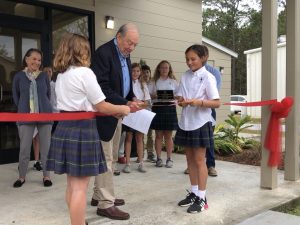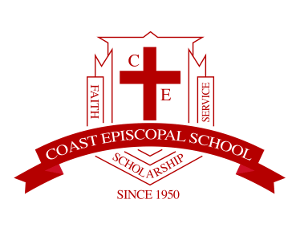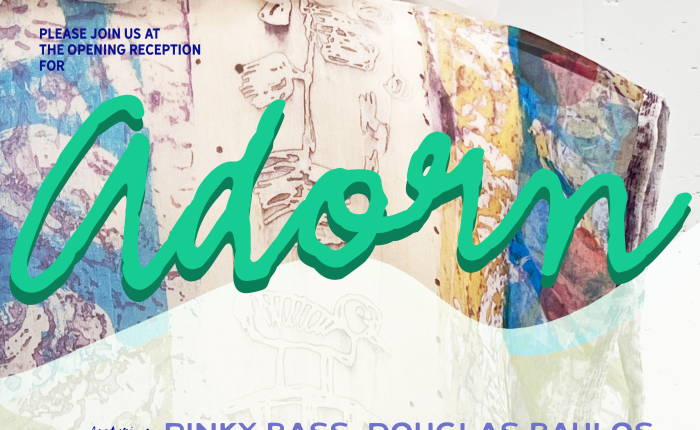
Robots. 3D Printers. Animation. Laser-cutters. Soda Bottles. Pipe cleaners. Popsicle sticks. From complex to simple, Coast Episcopal School’s Makerspace provides its students with endless, hands-on opportunities for learning. On Thursday, November 18, 2021, the new multi-technology asset of CES in Long Beach, Miss., was officially dedicated as “The Seeman Makerspace.”
Made possible by the vision and generosity of Bill and Wynn Seemann, The Seemann Makerspace at Coast Episcopal School has been enriching the lives of students since October 2020, when the doors of the multi-technology classroom first opened. On Thursday, the Covid-delayed dedication to the Seemanns took place when students, faculty and staff gathered to honor the family, whose gift was memorialized with a brass plaque that will grace the building’s entrance to welcome eager, engaged students for years to come.
“Making things is fundamental to what it means to be human,” stated Bill Seemann. “From earliest civilizations, we have made tools, houses, boats, automobiles. There is a joy to conceiving and making things with our hands. Now we see ourselves entering a new world where more and more of what is made is designed and manufactured with the aid of computers. Becoming familiar with this technology and using it to make things at an early age is going to help our children succeed in an increasingly complex world.”
“From the moment I told Bill that CES was considering adding a makerspace, he was enthralled,” said Wynn Seemann, “and, as a longtime educator whose philosophy has always been that children learn by doing, so was I.” The Seemanns traveled to makerspaces in other places to learn what the addition of a technology-based building could mean to CES students. From that point forward, “Bill was on it!” Mrs. Seemann recalled. “He began designing the building, selecting the materials, and overseeing its construction.
She added that her husband’s interest was no surprise. “Bill is a maker. He has always been curious about how things work and challenged to learn how to make them work better. He has turned that passion into a career.” Mr. Seemann is the founder of Gulfport-based Seemann Composites, Inc., which is based on his industry-transforming research and development in composite fabrication.
The CES Makerspace boasts three 3D printers, a laser cutter and a vinyl cutter for creating objects; a greenscreen and iPads for movie production; and Ozobots (robots) that introduce coding. Technology meets everyday objects with the utilization of recycled and simple materials such as cardboard, soda bottles, popsicle sticks, pipe cleaners and hot glue.
The projects taking place within the Makerspace walls are an extension of lessons in CES’s traditional classrooms, as the faculty works closely with Makerspace Director Will Ashley to tie curriculum into technology. Ashley, a Coast Episcopal alumnus himself, graduated from Mississippi State University in 2015 and went on to Penn State University, where he worked under the direction of mentor Dr. Gabriela Richard, focusing on Science, Technology, Engineering, Art and Mathematics (STEAM)Maker workshops, and received his Masters Degree in Learning, Design and Technology in 2019.
“I was thrilled to return to my alma mater as the Makerspace Director in 2019, and my goals are to work with classroom teachers to blend curriculum into as many projects as possible, while, at the same time, allowing our students to let their creativity, curiosity, and personal interests dictate the projects we create,” Ashley said. “In the Makerspace, we demonstrate that no idea is too big, and that failure is just the first step toward success.”
Evidence of that success is apparent in the faces of the sixth-grade students who have been impacted by Mr. Ashley’s direction for the last two years.
Henrietta Doxey has “enjoyed Makerspace since Day One” and cites her 3-D printer creation of a replica of her grandfather’s double-deck pontoon boat, MACHO (named after his grandchildren’s initials), complete with slide, water tank and seating, as her favorite project to date.
Mary Swinton Harris is enthusiastic about the Interactive 3-D plant cell her class created to complement their Biology unit. They then made a movie, using SCRATCH programming, to animate the cell’s wall, nucleus, mitochondrion, vacuole and chloroplast.
“We made each part come alive!” she said.
A pencil holder, created with a web app called Tinkercad that enables a drawing made by the student to “come to life,” is attached to the inside of Amelia Edrington’s locker.
“I made it by myself – from designing it by putting together blocks with Tinkercad and then printing what I designed with the 3-D printer,” she said.
The impact the Seemanns’ gift has already had on CES students is incalculable, and it is sure to multiply throughout the years.
“Two years later, we are thrilled to see how this new space and the philosophy behind it are enriching the students of Coast Episcopal, “ reflected Mrs. Seemann.
“It is our hope that this Makerspace will not only help the children of Coast Episcopal, but also encourage other schools on the Gulf Coast to bring the love of making things to students of all ages,” said Mr. Seemann. “We need to start young to prepare our children for what lies ahead.”
Coast Episcopal School has been dedicated to a life-long love of learning by developing the whole child – mind, body and spirit – and providing a joyful, unique, and nurturing Judeo-Christian community that inspires its students to imagine and create a better world. Founded in 1950, CES is accredited by the Southern Association of Independent Schools (SAIS). For additional information: Coast Episcopal School, 5065 Espy Avenue, Long Beach MS 39560. 228-452-9442 coastepiscopalschool.org.




